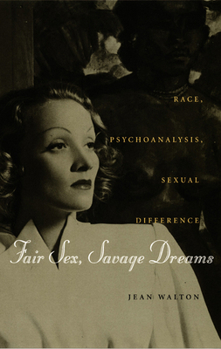Fair Sex, Savage Dreams: Race, Psychoanalysis, Sexual Difference
Select Format
Select Condition 
Book Overview
In Fair Sex, Savage Dreams Jean Walton examines the work of early feminist psychoanalytic writing to decipher in it the unacknowledged yet foundational role of race. Focusing on the 1920s and 1930s, a time when white women were actively refashioning Freud's problematic accounts of sexual subjectivity, Walton rereads in particular the writing of British analysts Joan Riviere and Melanie Klein, modernist poet H.D., the eccentric French analyst Marie Bonaparte, and anthropologist Margaret Mead.
Charting the fantasies of racial difference in these women's writings, Walton establishes that race-particularly during this period-was inseparable from accounts of gender and sexuality. While arguing that these women remained notably oblivious to the racial meanings embedded in their own attempts to rearticulate feminine sexuality, Walton uses these very blindspots to understand how race and sex are deeply imbricated in the constitution of subjectivity. Challenging the notion that subjects acquire gender identities in isolation from racial ones, she thus demonstrates how white-centered psychoanalytic theories have formed the basis for more contemporary feminist and queer explorations of fantasy, desire, power, and subjectivity.
Fair Sex, Savage Dreams will appeal to scholars of psychoanalysis, literary and cinematic modernism, race studies, queer theory, feminist theory, and anthropology.
Charting the fantasies of racial difference in these women's writings, Walton establishes that race-particularly during this period-was inseparable from accounts of gender and sexuality. While arguing that these women remained notably oblivious to the racial meanings embedded in their own attempts to rearticulate feminine sexuality, Walton uses these very blindspots to understand how race and sex are deeply imbricated in the constitution of subjectivity. Challenging the notion that subjects acquire gender identities in isolation from racial ones, she thus demonstrates how white-centered psychoanalytic theories have formed the basis for more contemporary feminist and queer explorations of fantasy, desire, power, and subjectivity.
Fair Sex, Savage Dreams will appeal to scholars of psychoanalysis, literary and cinematic modernism, race studies, queer theory, feminist theory, and anthropology.
Format:Paperback
Language:English
ISBN:0822326116
ISBN13:9780822326113
Release Date:February 2001
Publisher:Duke University Press
Length:256 Pages
Weight:0.90 lbs.
Dimensions:0.7" x 5.8" x 9.0"
Customer Reviews
0 rating





